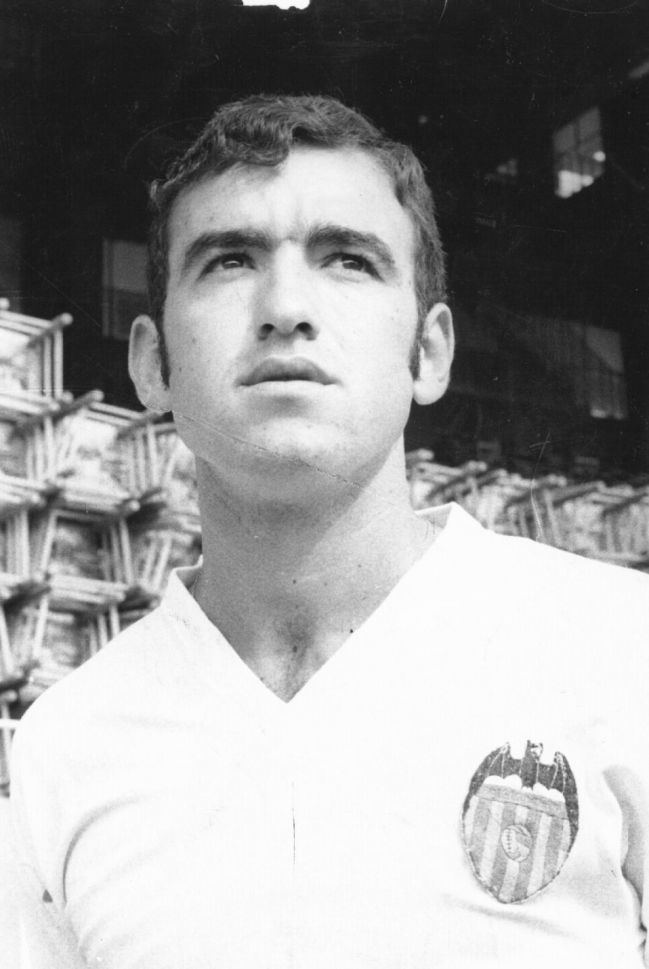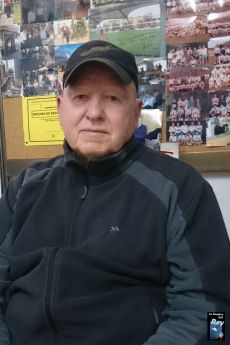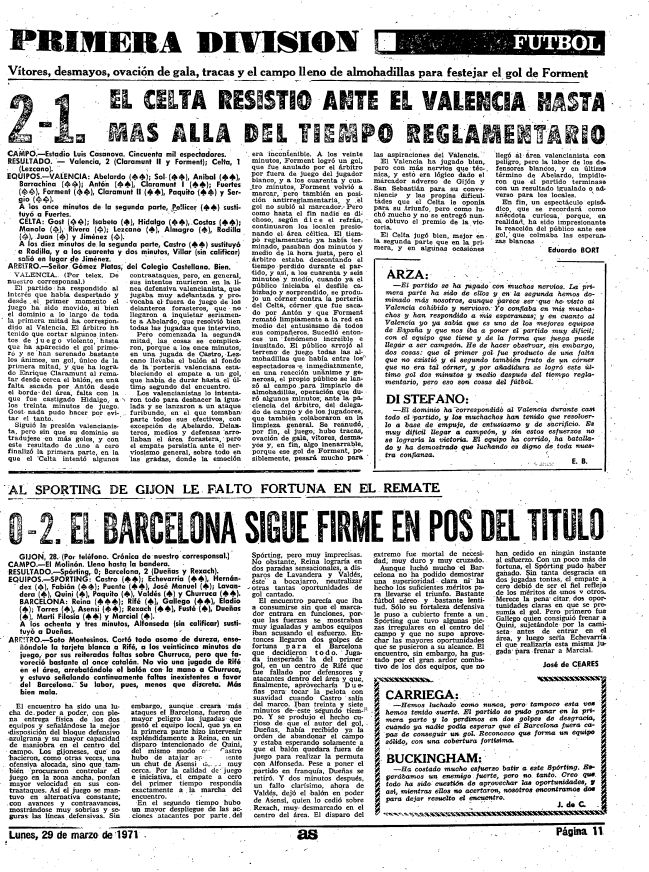
By
A goal hug is something unique. Each fan has one in their memory and there are goals that are the history of a generation. The longest-serving Valencians speak of one Igoa in the Cup semifinals against Athletic in 1950, which put the score 6-2, thus equaling 5-1 in the first leg and which forced an extension decided by Gainza. The youngest will always have on their retina that of Rodrigo Moreno Getafe in the 2019 Cup. Tendril to Real Madrid that avoided relegation in 1983 or that of Robert Fernandez Buyo in 1992. And a separate chapter deserves that of Rubén Baraja to Espanyol in April 2002, which brought him closer to the league title 31 years later. But on March 28, 1971, 50 years ago today, a goal was celebrated at the Mestalla like no other has ever been celebrated. Forment's eternal goal.
Celta visited Mestalla in the absence of four days. Di Stéfano's Valencia had one more point in the standings than their two pursuers, Atlético de Madrid and Barcelona, who were playing away from home in San Sebastián and Gijón that weekend respectively. A goal from Enrique Claramunt put Valencia ahead. But, midway through the second half, a chain error by the Valencian defense led to the goal of the tie for the Vigo players. At that moment, the Dardo de Mestalla scoreboard, still called Luis Casanova, reflected the victories of the rojiblancos and azulgranas. Time passed and the referee Gómez Platas canceled two goals against Valencia for offside. Both from Forment, one in 65 'and the other in 88'.
That second annulled goal ignited the anger of the Luis Casanova audience, where he had about 60,000 souls. The capacity of the stadium was greater than today and there were not the access controls that there are now. The stands were even closer to the field of play and the fans came to the games with strakes in their pockets like those who now carry pipes. A shower of pads invaded the field of play in protest at that second disallowed goal. The game had to be interrupted for a few minutes and hence the 92nd game was reached. At that moment the referee whistled a corner in favor of Valencia, protested by the Vigo team (Arza, his coach, concluded: “The goal was the result of a corner that was not such a corner”). Sergio centered, Forment finished off and what later was lived was something apotheosis, incomparable. So much so that 50 years later, Forment's goal is still celebrated.
“He caught my father and I already in the vomitory; I have never seen a celebration like it.”
Luis Casanova, son of the legendary president of Valencia, present this day in Tribuna
Luis Casanova, son of the legendary and most successful president of Valencia, he was one of the thousands of Valencian players who were at the Mestalla that afternoon in March, a stadium that precisely bore the name of his father. “That day, like so many others, I went to football with my father,” recalls Luis Casanova with his encyclopedic memory. “We did not see the goal, we felt the goal, we used to leave our Tribune seats a few minutes before finishing, otherwise it was impossible to leave the stadium with my father, and the goal already caught us in the vomitories, like this that what we really saw and lived was the madness of the people, I had never seen anything like it, what a fuss! “
“I didn't see a goal, I saw a miracle; the celebration was tremendous”
Paco Lloret, journalist, present at Mestalla that day in Sector 4
Journalist Paco Lloret He was 10 years old and that day he and his father occupied his seat in row 14 in sector 4 of the so-called numbered grandstand. “That corner was seen by the whole stadium standing up, I think we all pushed that ball; I didn't see a goal, I saw a miracle ”, he says 50 years later. “What happened after the goal was a tremendous thing, canvas pads fell, which were very heavy, from all corners of the stadium; my father protected me with his raincoat, the stands were shaking, firecrackers sounded, there was an invasion of the field … I got a little scared, really ”.
“People invaded the field because they needed to have space to be able to jump for joy”
Paco Gisbert, writer, present at Mestalla that day in row 2 of Tribuna
Paco Gisbert, journalist and writer, he also went to football with his father. I was 8 years old. Both took their seats in the second row of the Tribuna, very close to the corner of the opposing wing from which Sergio put into play the ball that Forment finished off. “My memory is that the ball entered as in slow motion and that no one at the Mestalla really knew who had finished off; my eyes went to Sol, who raised his arms half hooked on the net, and then to the referee, to see if he considered it valid, because that afternoon he had annulled two goals against Forment and this, yes, it was a goal “, recalls Gisbert, that that day he found that “the throwing of pads is not only a symbol of protest but it can also be a symbol of happiness.”

Jose Vicente Forment, in his time as a Valencia player.
José Vicente Forment (Almenara, 1947) He smiles with tenderness, pride and nostalgia when he receives the call from AS. What if I remember that goal? 50 years have passed, the truth has rained … but how can I forget it ”. The ‘xic d’Almenara’ was one of the pillars of Alfredo Di Stéfano's Valencia, League champion against all odds in 1971, a team whose main virtue was its defensive strength and in which the top scorer was precisely Forment (8 goals). On March 28, 1971, he scored his eternal goal, whose memory half a century later justifies a career cut short by a tackle by Aguirre Suárez who broke his leg on September 17, 1973 in Granada.
Today marks the 50th anniversary of his goal against Celta …
How far it is. It makes me happy that they still remind me of it. I think I'm happier now than then. Now I know that in my life something unforgettable. Playing for Valencia, scoring that goal… for those of us from here, you couldn't ask for more. That pride!
How do you remember it?
We had to win yes or yes. Otherwise Atlético and Barcelona would have passed us in the standings and when you have two ahead of you with only three games left… goodbye Liga. In the last gasp of the game they whistle us a corner in favor. Sergio was in charge of taking it out. We all went up to the area except Abelardo, who was the goalkeeper and then it was not well seen for him to go up. The arrival of our defenders, who were strong guys like Sol, Aníbal, Barrachina or Antón, made the Celta players stick to them and they let me loose … and half a century later people continue to talk about my goal.

José Vicente Forment.
DAILY AS
It qualifies as the most celebrated goal in Mestalla. How was that hubbub on the lawn experienced?
It was a tremendous thing. Important goals have always been scored, without going any further the following week we played in Sabadell and Antón gave us victory almost also in discount. But what happened that afternoon after my goal was different from anything I had experienced. Perhaps because the game was tense, in which I was annulled two goals for offside that even today I don't know if they were… People exploded with happiness. Thousands of flying pads, strakes, fans jumping alongside us. Even the players began to remove pads to finish the game.
And what happened in the locker room?
Well imagine. Don Julio de Miguel came down to congratulate us, I remember Don Vicente Peris crying through the tunnel… There they vented all the nerves that passed in the box and I think that day we firmly believed that we would be champions.
But they were against all odds.
We weren't the favorites, but we grew as a team. There were three or four of us who came from Second. There were many of us Valencians, and that is always a plus: Sergio, Enrique, Pepe Claramunt, Vidagany, Cota, Pesudo… although the Paquito, Sol, Valdez or Pellicer were people who were as involved as we were. And then there was Don Alfredo, who was very much Don Alfredo.
When did you think you could win the League?
Halfway through the season, Don Alfredo began to send us signals and questions: “why can't we? Are you sure you are not capable? And there we began to believe it.
“My best goal was scored against Bayern de Beckenbauer; I made three cuts to Breiner and I beat Maier with a good shot”
How was Don Alfredo Di Stéfano as a coach?
As I told you, Don Alfredo was Don Alfredo. He killed to win even in the rounds. He was very clear about what we had to do and how we could be champions. I remember a game we played against Atlético de Madrid in which we lost 3-0. When he got to the dressing room he told us: “Now you will see how they say in Madrid that Valencia is the best that has been here, that he plays well … and I do not want them to say that, I want them to say that we are the worst but because we have won 0-1 ”.
Was it the best goal of your career?
Of execution? No. Of importance and significance, for sure. It was a goal of instinct. There was nothing rehearsed or talked about. Sergio center and you had to finish as whoever you could. And I finished off. That league I made 8 goals. One of them against Real Madrid, which helped us to become leaders. But my best goal, technically, was in the Orange Trophy. Beckenbauer's Bayern Munich. I made three cuts to Breiner and I beat Maier with a good shot. That goal was not important but it was extraordinary. But obviously if you've called me, if people remember me, it's not because of that goal but because of the one I scored against Celta, how proud I am that people still remember that goal!

Chronicle of Mundo Deportivo.
Jaime Hernández Perpignan, in his chronicle of the match for the Sports Weekly, He did not hide that he had no explanation for the reason that led the Mestalla public to throw the pads as an expression of joy: “Who knows why”, he wrote in an article that he titled: “Clamorous epilogue in the Casanova: Forment, in the 92nd minute, he scored the winning goal ”.
“And we arrived at minute 47 of the second half: Sergio takes corner number 14 of those thrown by Valencia. All Valencian players come to the auction ready to burn the last cartridge, in the end it is Forment who manages to connect a header that irrevocably beat Gost. The crowd was delirious and the game was interrupted for a few moments because Luís Casanova's lawn was materially covered with pads ”. So it ended Josimbar his chronicle for Sports world.

Page of March 29, 1971 of AS.
Eduardo Bort, in his chronicle for ACE, was recreated more in what happened after that goal in Mestalla. “An incredible and unusual phenomenon then happened. The public threw all the pads that were among the spectators onto the pitch and immediately, in a unanimous and generous reaction, the public itself rushed onto the field to clean it of pads, an operation that lasted a few minutes before the patience of the referee, the delegate of field and of the players, who also collaborated in the cleaning in general. The game finally resumed, there were fireworks, a gala ovation, cheers, fainting spells, and finally, something unspeakable, because that goal from Forment will possibly weigh heavily on Valencia's aspirations. In short, an episodic show, which will be remembered as a curious anecdote, because in reality the reaction of the public to that goal has been impressive ”. And he was right in his reflection, because 50 years later that reaction continues to be remembered.
Forment's goal was not the last Valencia scored that season. He wasn't even the one who gave him the title. There were three rounds left after that match against Celta and those two points were as important as those that Di Stéfano's Valencia got a week later in Sabadell thanks to a Antón's goal in the 89th minute or the three of the victory against Elche on the penultimate round. But the one from Forment has a mystique that the passage of time has given it a story, literature and makes it “eternal”, as the chapter dedicated to it by Paco Lloret in his work is precisely entitled ‘Bronco and Cupbearer”, a “miraculous history-changing” goal, as defined in the book ‘Last vesprades to Mestalla’ (Carena)

Cover 'El Niño de Di Stéfano', a book that revolves around the 1971 League.
“Mestalla attended that spring Sunday to a memorable outcome (…) The euphoria overflowed in such a way that the match could not be resumed. An explosion of uncontrollable jubilation invaded the stands. It was kind of a miracle. Forment, with the number eight on his back, was the author of that goal, still remembered by those who attended the match. Impossible to forget (…) That header goal will always be his goal. The indelible postcard of a League won against the odds by Valencia in 1971 “ (Bronco and Copero, Àrbena).
Complete books have been written about Forment's goal, what was Liga del 71. Like Paco Gisbert's: ‘The Child of Di Stéfano’, which recounts what happened last Sunday in March at the Luís Casanova: “Dozens of fans jumped onto the pitch, not to hug the players, but to bounce with joy, to express their joy with more space than their locality left them in the tribune, crowded with people, while the grays, always attentive to safeguarding public order, made gestures to them so that they did not enter the field of play, unable to contain the avalanche and return the leapers to their localities. But no one intended to invade the field, but to enjoy, in company and with a certain freedom, of that unique moment ”.

SOCCER 18 / 19Forment lighting the fireworks in tribute to his goal at the Mestalla gate on March 28, 2019.
DAVID GONZALEZ (DIARIO AS)
Forment's goal has been celebrated for four years every March 28 with the firing of a fireworks in Mestalla. The fault is Rafa Lahuerta, who was born in September 1971 and perhaps that afternoon felt in his mother's womb the excitement that got messy in the stands after Forment's header. “My father was one of those who jumped onto the grass and my mother stayed in the stands because she was pregnant; who knows, I even remember it and that is why I have always had so much faith in that goal “, confesses the author of ‘The Ballad of Bar Torino’ and 'Norway'.
“Every March 28, in my youth, I would say to my colleagues: 'Today is a great day, today is the day of Forment's goal.” And of course, they looked at me and said: 'You're crazy' “, says Lahuerta, who has spread his madness and in that frenzy we are, commemorating a goal that was scored 50 years ago and that alone did not make Valencia win the League, although another has never been celebrated in the same way.
“Forment's goal justifies a life”
Rafa Lahuerta was in Mestalla that day … in his mother's womb
Thus, at the gates of the Centennial of Valencia, with no other pretense than to share a memory with his intimates, Lahuerta made public in an interview that he would honor that goal by Forment with the firing of a firearm at the gates of Mestalla for its 47th anniversary. “Paco Lloret gave me Forment's phone number to let him know if he wanted to participate, I was even ashamed to ask him, but he agreed, surprised and delighted.” It was Forment that that afternoon in 2018 lit the fireworks. It was an intimate, simple act, in the shadows; a lighter and a firework; no speeches or anything prepared; with just a dozen participants and passersby who looked at them strangely. But that fireworks lit the flame of memory.
“It has been done poetic justice with Forment, a victim of the defense of Granada of the 70s like Amancio, although his injury did not have the repercussion of the Madridista ”. In 2019 those present on the afternoon of March 28 exceeded one hundred and the pandemic deprived of the reunion in 2020. Health measures advise against a concentration in Mestalla today, although in some safe place something will be done, because Forment's goal is eternal and turns 50. As Lahuerta defines it: “That goal justifies a life.”

